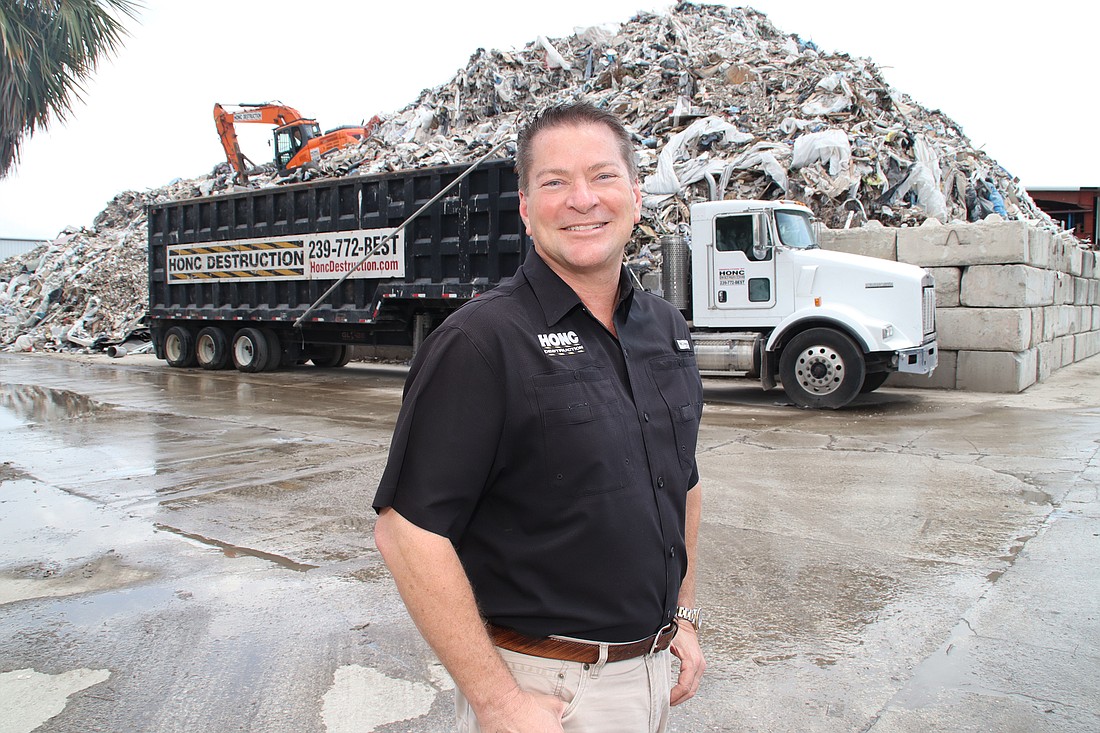- November 23, 2024
-
-
Loading

Loading

One man’s trash, it has been said, is another man’s treasure.
If that old adage is true, entrepreneur David Mulicka has his own 6-acre trove filled with a never-ending supply of treasure — which might otherwise be headed to a landfill — and delivered to him all day, every day by the dump truck load.
Mulicka, founder and owner of Honc Destruction, a Fort Myers-based demolition company, acquired a recycling facility off Alico Road in 2015. He rebranded it Honc Recycling, which, after tripling its gross revenue over three years, is expected to hit $12 million in revenue in 2019. With a goal of recycling more than 90% of construction and demolition debris it receives by the end of 2019, Mulicka aims to operate the most efficient recycling facility in Lee County and beyond.
During the now four-year journey to top efficiency, Mulicka has learned a valuable entrepreneurial business lesson about being nimble and shifting quickly to meet unexpected market demand. For one, the shift has required more manpower: The company has gone from 21 employees in 2015 to 54 now, which includes plant workers, truck drivers and demolition crews.
“We separate cash from trash,” Mulicka says as he stands next to a small mountain of Hurricane Irma-related demolition debris waiting to be scooped and loaded into the new $3 million sorting line the company installed about a year ago. The debris comes from his own demolition company and by outside haulers who pay upfront to dump the materials. From there, it is mechanically and hand-sorted by metals, rocks, wood, cardboard, fill material and more that is then hauled away and sold.
Currently, only about 20% of the materials that enter the site end up as trash. The rest is treasure — about 800 tons of it a day.
Mulicka founded Honc Destruction in 2002, one of several local companies in Cape Coral that carry the Honc (pronounced “Honch”) family name. He is the only non-Honc running one of the businesses — John Honc Jr. became his stepfather when Mulicka was 9 – and soon learned the cost of disposing debris limited his revenue potential. So he decided to become his own best customer.
“The demolition business is what spawned the recycling business,” Mulicka, 51, says. “Demolition was my primary business, but I quickly discovered my biggest expense and variable was disposal fees, and I was beholden to the landfill whenever they would change their prices. The only way to control that was to haul less to them.”
'Anything we can do to make our resources last longer is better for everybody.' David Mulicka, Honc Recycling
That cost was $1 million to $1.3 million annually the three years prior to opening the recycling business. Mulicka says he now saves more than $800,000 per year in disposal fees alone by recycling most of it, which doesn't include revenues from sale of the raw recyclable material.
The capacity of the plant when Mulicka acquired it was about 100 tons a day. He recouped that investment in 18 months of operations. The massive sorting line installed last year, which increased capacity to 1,000 tons per day, will pay for itself within another year, he says.
Mulicka expects the Irma-related debris pile to be recycled sometime this summer, which would allow the plant to accept more outside business. Currently, about two-thirds of what the plant processes is Honc Destruction jobs, the remainder from others. It is increasing the volume it can accept from outside at about the same pace as the Irma pile is processed.
“As the pile goes away, I can handle more,” Mulicka says. “When this is going well, I can have three trucks in a row dumping at one time and have a line of trucks at the gate.”
Growth plans, meanwhile, center on the current site with a possible future addition of adjacent property, if available. Expansion will come in more material types processed, efficiencies created by technology and extended reach to more haulers. “There are opportunities with glass and with plastic, and if you have enough of it, you can make treasure out of that also,” Mulicka says.
Honc Recycling also reuses, donates and sells objects retrieved in demolition jobs, such as appliances, building materials, furniture and office equipment — items to date valued at around $1 million. The ceiling tiles in the office conference room, for example, came from a demolition job. Steel on the exterior of the building was from another. “If my kitchen looks like a Publix sushi bar,” Mulicka says, “it’s because that’s what it is.”
In addition to good business, Mulicka adds, recycling is good for everyone. “Anything we can do to make our resources last longer is better for everybody.”